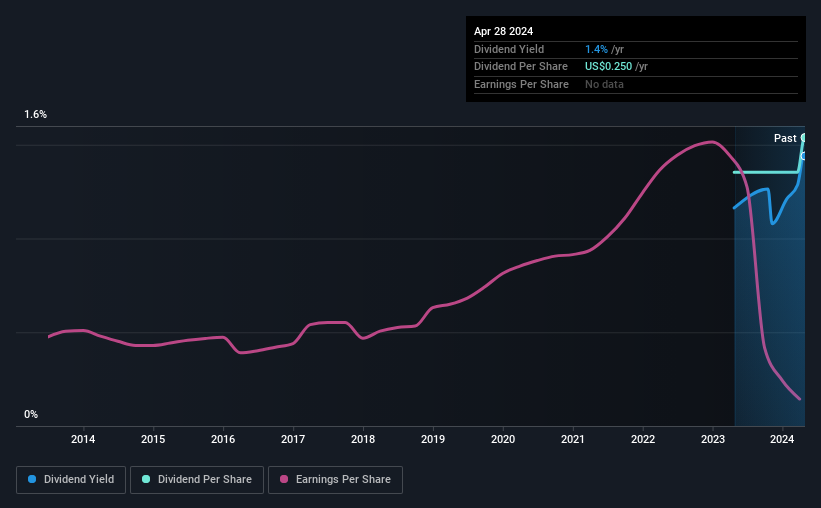John Marshall Bancorp (NASDAQ:JMSB) Has Announced That It Will Be Increasing Its Dividend To $0.25
John Marshall Bancorp, Inc. (NASDAQ:JMSB) has announced that it will be increasing its dividend from last year's comparable payment on the 8th of July to $0.25. Although the dividend is now higher, the yield is only 1.4%, which is below the industry average.
View our latest analysis for John Marshall Bancorp
John Marshall Bancorp Will Pay Out More Than It Is Earning
If it is predictable over a long period, even low dividend yields can be attractive.
Currently, John Marshall Bancorp does not yet have a history of paying dividends out, with this being its first year doing so. But while John Marshall Bancorp was able to finally pay out a dividend for the first time, its most recent earnings report shows the company's net income didn't cover its dividend distribution. This is an alarming sign for the sustainability of its dividends, as it may mean that John Marshall Bancorp is pulling cash from elsewhere to make its shareholders happy.
If the company can't turn things around, EPS could fall by 26.1% over the next year. Assuming the dividend continues along recent trends, we believe the future payout ratio could reach 158%, which could put the dividend under pressure if earnings don't start to improve.
John Marshall Bancorp Doesn't Have A Long Payment History
The company hasn't been paying a dividend for very long at all, so we can't really make a judgement on how stable the dividend has been. This doesn't mean that the company can't pay a good dividend, but just that we want to wait until it can prove itself.
Dividend Growth Potential Is Shaky
Investors could be attracted to the stock based on the quality of its payment history. Let's not jump to conclusions as things might not be as good as they appear on the surface. Over the past five years, it looks as though John Marshall Bancorp's EPS has declined at around 26% a year. Such rapid declines definitely have the potential to constrain dividend payments if the trend continues into the future.
We're Not Big Fans Of John Marshall Bancorp's Dividend
In summary, investors will like to be receiving a higher dividend, but we have some questions about whether it can be sustained over the long term. The company seems to be stretching itself a bit to make such big payments, but it doesn't appear they can be consistent over time. Overall, the dividend is not reliable enough to make this a good income stock.
Companies possessing a stable dividend policy will likely enjoy greater investor interest than those suffering from a more inconsistent approach. Still, investors need to consider a host of other factors, apart from dividend payments, when analysing a company. As an example, we've identified 1 warning sign for John Marshall Bancorp that you should be aware of before investing. Looking for more high-yielding dividend ideas? Try our collection of strong dividend payers.
Have feedback on this article? Concerned about the content? Get in touch with us directly. Alternatively, email editorial-team (at) simplywallst.com.
This article by Simply Wall St is general in nature. We provide commentary based on historical data and analyst forecasts only using an unbiased methodology and our articles are not intended to be financial advice. It does not constitute a recommendation to buy or sell any stock, and does not take account of your objectives, or your financial situation. We aim to bring you long-term focused analysis driven by fundamental data. Note that our analysis may not factor in the latest price-sensitive company announcements or qualitative material. Simply Wall St has no position in any stocks mentioned.

 Yahoo Finance
Yahoo Finance 
